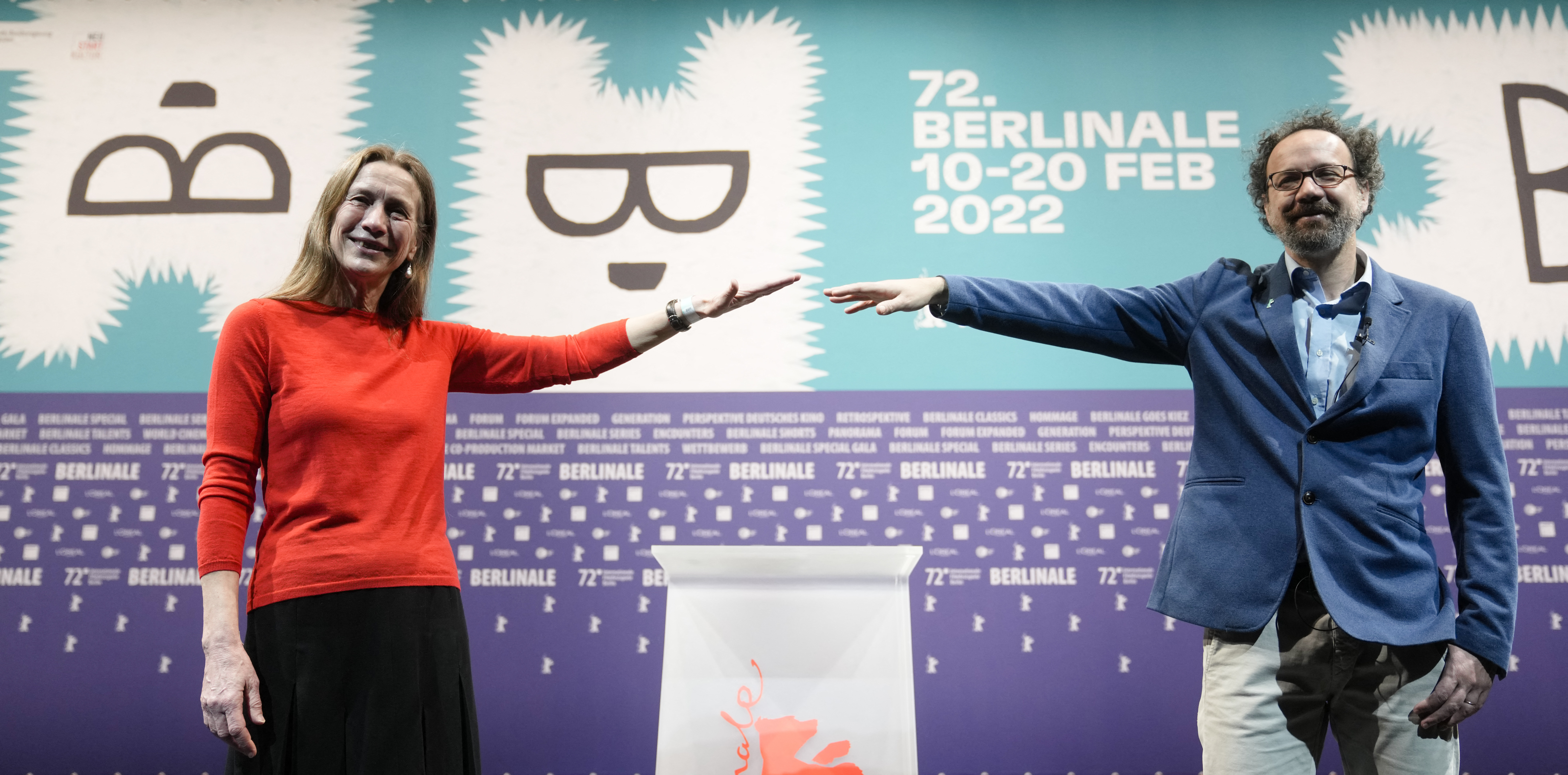Berlin filmfest to go forward in person as COVID-19 surges

The artistic director Carlo Chatrian (R) and managing director Mariette Rissenbeek, of the International Berlin Film Festival Berlinale pose for photographers during a media event, prior to the official program presentation for the 72nd Berlinale, in Berlin, on January 19, 2022. – The festival runs from February 10 to 20, 2022. (Photo by Markus Schreiber / POOL / AFP)
Berlin, Germany — The Berlinale, Europe’s first major film festival of the year, will take place next month as an in-person event, organizers confirmed Wednesday, just as the Omicron wave is expected to peak in Germany.
Surprising some observers expecting it to go online for the second year running, the Berlinale announced a program with 18 films in competition.
It includes new movies from France’s Francois Ozon and Claire Denis, “Carol” screenwriter Phyllis Nagy, and previous winner Paolo Taviani of Italy.
Expecting thousands of guests from around the world, festival directors Mariette Rissenbeek and Carlo Chatrian told a virtual news conference they had come up with a plan with state health authorities for its 72nd edition.
It includes a shorter program, requirements for participants to be vaccinated or recovered from COVID-19, and smaller audiences to keep participants safe.
Article continues after this advertisement“We have decided to go with an in-presence festival because we really believe that the collective experience is at the center of a film festival,” Chatrian said.
Article continues after this advertisementBerlinale, which ranks along with Cannes and Venice among Europe’s top cinema showcases, is set to run between February 10 and 20.
But the screenings for reporters, critics, and industry participants have been curtailed to seven days, followed by four days of movies for the general public.
Cinemas and theaters are still open in Germany but most large events and fairs across the country have been canceled to try to curb the spread of the virus.
‘We need cinema’
The announcement came as Germany’s daily toll of new COVID-19 cases topped 100,000 for the first time, with Health Minister Karl Lauterbach predicting the current wave of infections to crest in “mid-February.”
Prestigious US festival Sundance, which has a long-standing partnership with the Berlinale, will start Thursday as an entirely virtual event.
German Culture Minister Claudia Roth said last week that the government had signed off on the live event to give the battered sector a boost.
“We want the festival to send a signal to the entire film industry, to cinemas and moviegoers, and to culture as a whole,” she said. “We need cinema.”
Ozon, one of France’s most acclaimed directors, will open the festival with “Peter von Kant” starring Isabelle Adjani, a remake of a classic Rainer Werner Fassbinder movie.
Denis, one of seven women directors in competition, will premiere “Both Sides of the Blade” starring Juliette Binoche and Vincent Lindon.
Nagy will present “Call Jane” starring Elizabeth Banks and Sigourney Weaver about a group of abortion rights activists in 1960s America.
And Taviani, who won the Berlinale in 2012 with his late brother Vittorio with “Caesar Must Die,” will unveil “Leonora Addio” about the murder of a Sicilian immigrant boy in Brooklyn.
Indian-born American director M. Night Shyamalan (“The Sixth Sense”) will head up the jury selecting the winners of the Golden and Silver Bear top prizes.
The festival will also award an honorary Golden Bear for lifetime achievement to French screen legend Isabelle Huppert.
Last year, the Berlinale, which was staging a two-part hybrid event, awarded the top prize to Romanian pandemic-era satire “Bad Luck Banging or Loony Porn.”